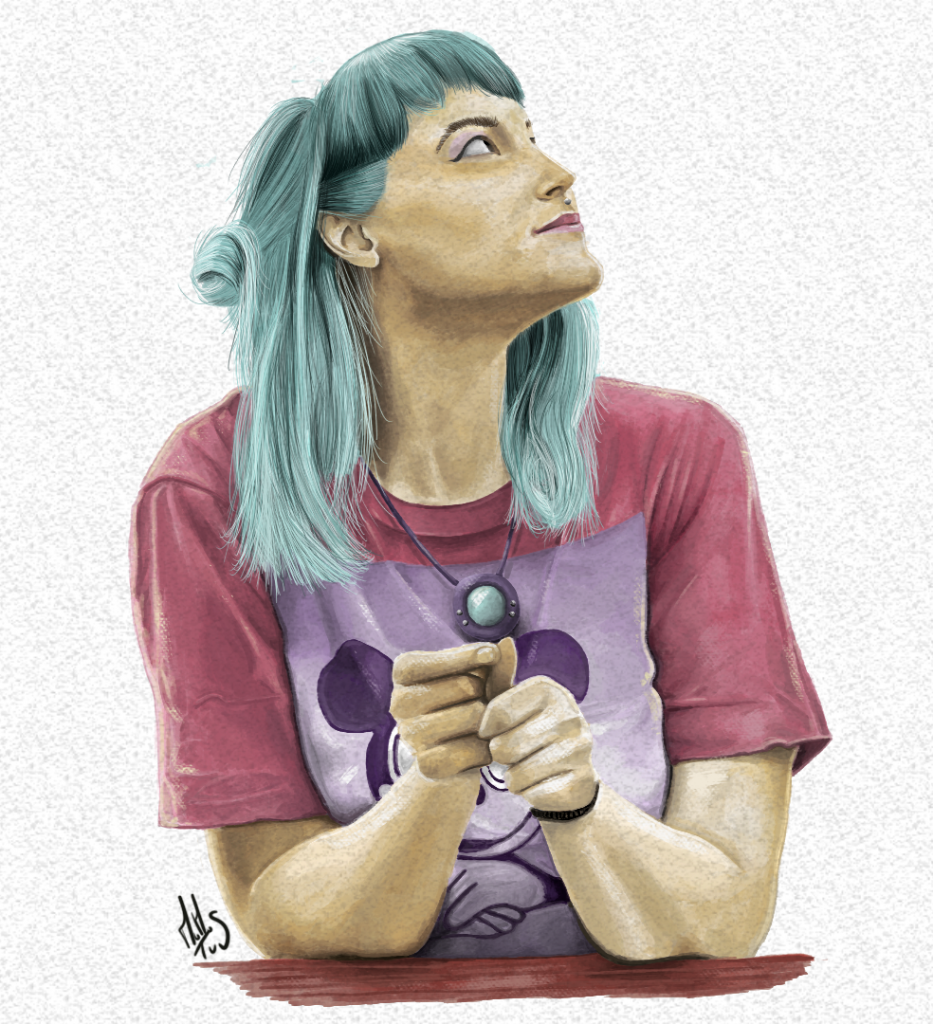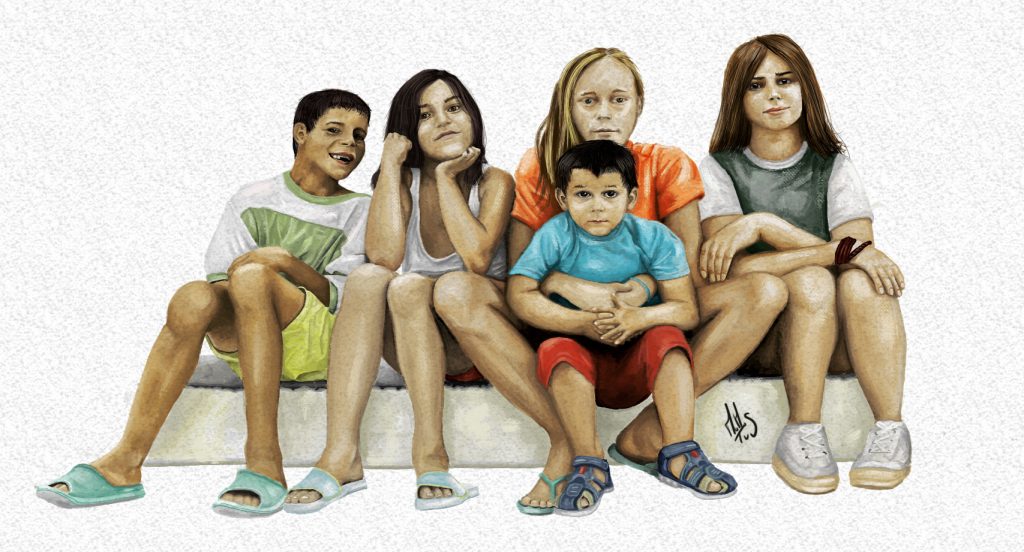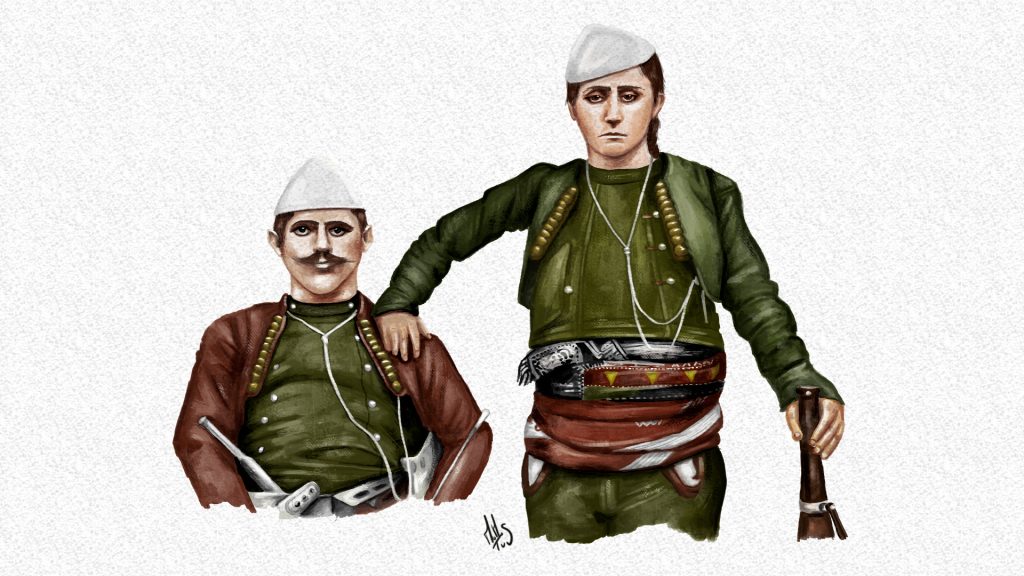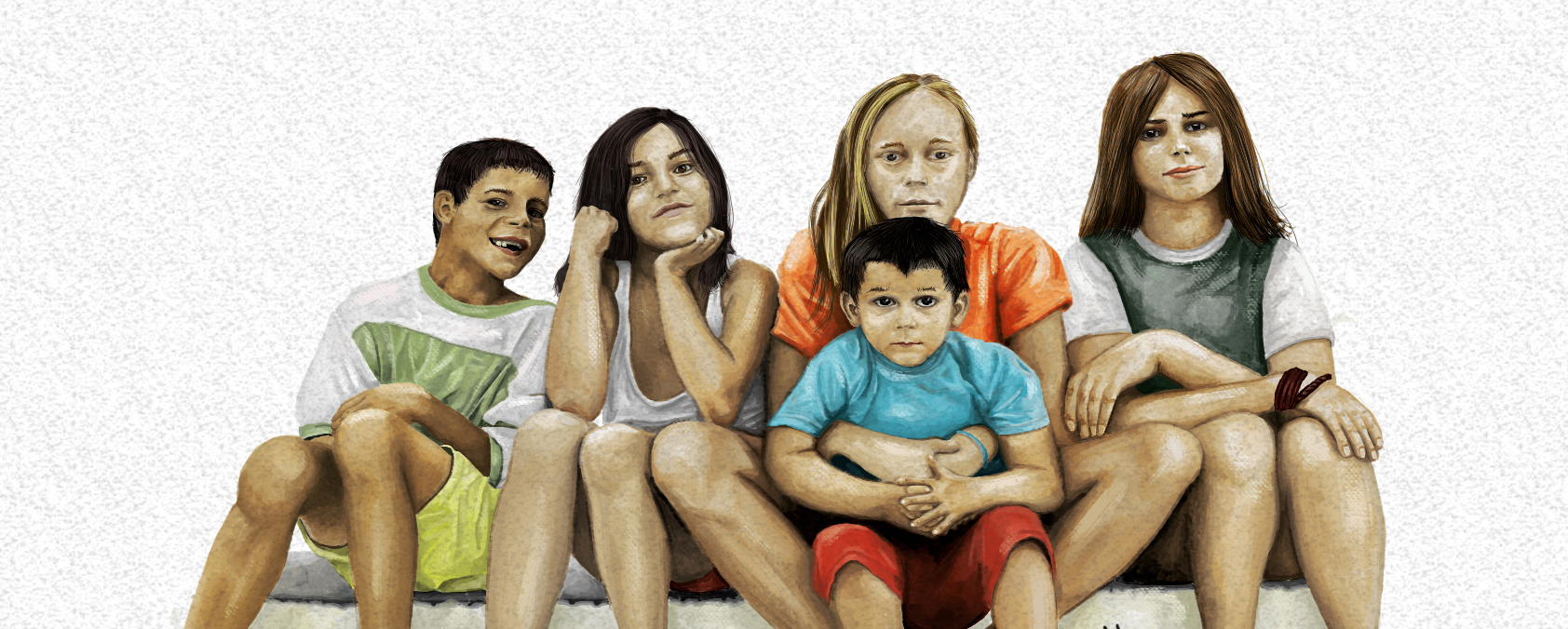Shqipëria. From repeating your name, I dreamed about you. I dreamed of this frozen image of a relic from the past. From your factory carcasses. Your empty Olympic stadiums. Your Stalinist monuments, there, enthroned in the middle of a desert plain, between a Soviet excessiveness and a lost grandeur.
A whole urban imagination, in short, very cold, contrasting with the idea I had of your house. A warm house, exuding hospitality and yet rustic, upright on its foundations and its clan traditions.
So, I flew to you. With my battered little Clio, I crisscrossed you. I have come across abandoned gas stations. Old Mercedes talking to you with horns and cuttings in. Stray dogs looking for a little warmth and a few bits of ham and butter. From old carts pulled by donkeys with foodstuff. So-called highways that look like Beirut.
| Article & illustrations by Momo Tus
The blue haired fairy in a man’s world.

Hair slicked back, decked out with their sunglasses, open collars and shiny gold chains
The three Albanian men bringing me the Clio at high speed looked as if they were affiliated with the local mob.
Surprised to see a woman alone: “Where is your boyfriend?”
In fact, Shqipëria, you have achieved the feat of putting one female face on my path..
Era. In Albanian, Era means “The one who is free”. But she isn’t though, at least not yet. Sweet, with her tiny piercing above the lip, her blue hair makes her even more dreamy when she looks out the window to elsewhere.
Fiddling around with her little “dreamcatcher” amulet all the time, she only dreams of that. To go away from you. Where she could change her hair color every week. Free to dream, but not free to do. Admiring my tattoos, Era cannot get one.
Because, with you, facing the men’s gaze is something else. I experienced that look.
This scrutinizing gaze from the uniquely masculine terraces. There, grouped together on the white plastic chairs, drawn to the fragrant aroma of Turkish coffee from the first light of the sun.
That look that got me a few invitations that I had to reject. This defensive fear of the man that comes to you when you are a woman. A regret, a bitter taste perhaps, to have sometimes missed encounters which were only motivated by curiosity and exchange. I blamed myself for this for a long time. But I hope you don’t blame me. How to strip the invitation of the other from all prejudice?
The fear of the other, of the different. Era, she undergoes it on a daily basis.
“The other day some kids thought I was a fairy.”.
A judged hair, which however does appear even more beautiful among the multicolored walls of the capital. Shqipëria, I don’t understand. Are you not the one who advocates this first step towards every human being, this outstretched hand to make sure everything is going well?
Whether you are Sunni, Shiite or Catholic? Refugee or from next door?
Like many of your kids, Era is stuck between a rock and a hard place. Between ancestral tradition and unbridled capitalism. Between tolerance and virility. Between benevolence and gangrenous corruption.
Like many of your young people, she dreams of studying in Europe, looking for a future that she cannot grow here. And maybe who knows, get a tattoo.

Children of the Lost City.
Grow. How to grow up at your home? That’s the question I asked myself as I pushed my little Clio to the max on this winding and rocky mountain path.
Almost absent from the maps, an old disfigured stone village scrutinizes me from the top. Four grannies sitting on a bench knitting, wearing long dresses and black scarves, wave hello to me.
I find myself greeted by a family of five children, taking my hand to lead me along the cobbled and narrow maze of this labyrinth. The children are playing. Take me from yard to yard through the holes in the walls. Jump from roof to roof. Run one after the other until they get stuck in dead ends.
A village abandoned by a wealthy landowner in the region. But the last inhabitants remain. Like this magnificent cross, illuminated, which indicates the church at the end of a passage, they remain, with luminous faces, among these ruins. They may not have amazing material comforts, but they are happy, for the time being. There, sheltered from the world and the concrete tourist coastline. So maybe your children, Ahmet, Delina, Klaudia, Mirina and Aleks will also want, like Era, to go elsewhere, to leave you.
But for now, they are using the innocence of childhood and this beautiful, unspoiled playground to grow up.
The nudist and the ancestral potion.
Shqipëria, I must say it, you have a few flaws but you gave birth to beautiful children. Generous, hospitable, proud children.
Sometimes too proud of it. It is not for nothing that in the past, we used to call you “people of soldiers”.
One of the pillars of Kanun, the medieval Albanian customary law, is to remind all Albanians “that their home does not belong to them, but that it is above all intended for God and for the guests of the house”.
Just like Juxhin, from the Eastern Mountains. With his shoulder-length hair and his little goatee, cross-legged on his colorful armchairs, smoking his long glazed earthenware pipe, he reminds me of Ali Pasha, an Ottoman sultan with many Albanian legends and conquests.
Surrounded by his cats, “Mace, Mace!” (cat) shouting regularly, he is already sipping his first Raki, a homemade brandy, in the morning.
The Raki, the very symbol of this hospitality, Juxhin draws it whenever he has people at home. Against sore throats, muscular pains, or simply, gloomy life, heartaches in the body, many Albanians themselves distill this magic potion.
A magic potion which also has the virtue of unbinding tongues. Several years ago, Juxhin swapped the suit for nothing, actually. Like many young people, like Era, he wanted to fly away, before realizing the richness of your land. Because of your long-closed borders, you have been able to preserve your treasures.
Juxhin then returned to nature, in the most natural way possible: naked.
Former manager of a nudist camp, he has this spiritual side that seeks only a smooth, hassle-free life. Happiness, he found it there, with you. With this perfect balance between meeting the other and meeting oneself. From animated discussions around Raki to meet the world, without leaving home, to the meditative silence of the mountains accessible in two shakes of a lamb’s tail.
I don’t know if it’s being on Raki permanently or just the way he is, but his lips always shape a light, broad, almost mischievous smile. Despite being 28 years old, Juxhin showed me that not all young Albanians dream of elsewhere. As if an external force enchanted the deeds and gestures of his daily life, the small happiness of simple things. We will leave each other with these words:
“You don’t see it, but you have a magnificent aura”.

The Kosovo Magnetic Insurgent.
I think back to Era and his belief in the power of dreams. Armed with her little notebook, she wrote down everything she remembered as soon as she got up. This Albanian mysticism bathes me throughout my journey in a sort of magical realism, on the borders of your most remote territories.
Here I am at the foot of the Northern Mountains, on the bridge on the verge of collapsing from the terrible battle of the dragùa (dragon-man) and the kulshedra (serpent-woman).
Land of traditions plagued by the mafia, this is where the ancestral and bloody custom of Kanun reigns: each human life is redeemed by another. Perhaps by the strength of fate, I discovered the photographic universe of the Marubi family there. For 80 years, this line of photographers will have immortalized countless faces in black and white through almost mythological scenes, even wakes.
A woman catches my eye among the hundred pictures. Armed to the teeth, she is standing, proud.
Her impassive face and her hand resting on her seated husband’s shoulder. Her white qeleshe and an oriental scarf covering her waistline contrast with her dark pants and her waistcoat adorned with discreet gilding.
That woman is Shote Galica, a Kosovo insurgent and glorious combatant leader of the Kachak, a guerrilla unit for the democratic awakening of Albania.
This woman fascinates me. Because, like the Kurdish fighters, her face and posture are enough to express all the determination, intelligence and pride she shows. “Life without knowledge is like war without a weapon.” she said.
So, as if we had missed a century apart, I quickly sketched her face on my sketchbook.
As if I was afraid of forgetting her, afraid of leaving her there in the whirlwind of all the patriarchal prejudices of the Land of Eagles. Around her, a certain secret magnetism tinged with openness emerges from each of the shots and stories. There are men in fustanel skirts, women in trousers, veiled Christian women, naked Muslim women. Shqipëria, you make me think a lot.
How did we get there?
The Turkish Ropdöşambır.
How did humans get there years later? To this fear of difference. To these diktats of the “right thinking”.
To this restriction of ideas, freedom, of human plurality.
This is the question I also asked myself with Baris.
Small, with dark skin and a benevolent gaze, Baris also travels the country alone. I feel that he is, what I call, “a sensitive of the Other”. This is his first trip. It’s rare for a young Turk.
Baris and I met by chance in the urban tumult to share a few moments of life. We realize that we have a lot of words in common and that we could almost understand each other in Turkish. Ropdöşambır (dressing gown), Șezlong (lounge chair), Kurdent (toothpick) …
Baris is one of the Turks who slowly slipped under a dictatorial regime. Just like you in fact, 30 years ago. You were then a prison, where people accused of harboring dissenting thoughts disappeared into the night. Where children were asked to spit on their teachers beaten by the police. Like the endless Erdogan purge.
Erdogan always wanted a conservative and pious youth. On the contrary, like the majority of his friends, Baris dreams of secularism, modernity, tolerance. Like Era, Baris dreams of elsewhere. To “leave for good”. As a student, he was one of the first to be mobilized in the street against the power in place, but things did not change .
Feeling like a tiny grain of rice in a cog bigger than you. I leave him, afraid that something will happen to him one day in Turkey.
Tiny facing your plurality.
I find myself tiny, facing the Little Father of Peoples, gigantic, the mustache very sharp, the eyebrows furrowed. Without a specific route and at the mercy of chance, loneliness often accompanies each of my steps.
A loneliness which, in the face of this past greatness, is all the more saving.
This Soviet grandeur, with your 750,000 bunkers sometimes up to more than 2,000 m² and your countless statues to the glory of the worker. This Byzantine and Christian grandeur, with your religious iconographies and your magnificent churches.
This Roman grandeur, with your ancient archaeological sites. This Ottoman grandeur, with your medieval houses and Skanderbeg, national hero who will have fought against this greatness. This Muslim grandeur, with your old mosques and your atypical Bektashi.
At each of these almost initiatory moments that I live in front of your past and your present, a diversity of temporalities, cultures, religions, identities jostle.
This is where I understand you are greater than your land. Fragmented, shelled, shared and isolated between centuries and humans, you have suffered. Despite everything, your sense of honor, of sacrifice, of dignity, of welcoming others, has managed to endure through each of your children. And that, on the scale of a people, is rare.
The Albanian poet Pashko Vasa said: “Do not look at churches or mosques, the religion of the Albanian is Albanity”, evoking the uniqueness of the Albanian language. However, for me, your people are not a people of one religion or one language, nor is it the people of a country, nation or identity.
Your people is a people of a code of values. Collective values that have been perpetuated for centuries which today face peculiarities, whether they are gender, religious, sexual, memorial, linguistic, customary related. Values that jostle within your children, but which I have the impression, at times jostle, without really meeting each other.
